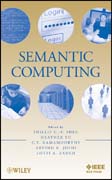
The goal of this book is to have in depth and thorough examination on the state-of-the-art semantic computing technologies. Beginning with a comprehensive introduction, understanding Semantic Computing which examines concepts, technology components, applications, and possible impacts of Semantic Computing, thebook covers the science and engineering aspects of Semantic Computing. It comprises individual component fields such as knowledge and data engineering, natural language processing, multimedia semantics, semantic web technologies, software and system engineering, signal processing, and pattern recognition for semantic computing, as well as interdisciplinary considerations and solutions to solve real life computing problems.Dr. Phillip Sheu, a fellow of IEEE, is professor at the University of California-Irvine. Dr. Sheu is currently active in research related to complex biological systems, knowledge-based medicine, semantic software engineering, proactive web technologies and large real-time knowledge systems for defense applications. He has authored two books and published more than 100 papers in object-relational data and knowledge engineering and their applications, and biomedical computations. Dr. Heather Yu is a Senior Scientist at Panasonic Information and Networking Technologies Laboratory. She received her B.S. degree from Peking University, her M.A. and Ph.D. degrees from Princeton University each in Electrical Engineering. C.V. Ramamoorthy is an emeritus professor of Electrical Engineering and computer science. IEEE honored Ramamoorthys achievements with the Taylor L. Booth Education Award in 1989, the Richard E. Merwin Distinguished Service Award in 1993, Golden Core recognition in 1966, and Tsutomu Kanai Award in 2000. He also received the IEEE Centennial Medal and the IEEE Third Millennium Medal. He has been an IEEE Fellow since 1978. Ramamoorthy was founding editor in chief of IEEE Transactions on Knowledge and Data Engineering and served as editor in chief of IEEE Transactions on Software Engineering, He has published more than 150 papers, co-edited three books, and holds patents in computer architecture, software engineering, computer testing and diagnosis and databases. Aravind K. Joshi is the Henry Salvatori Professor of Computer and Cognitive Science at the University of Pennsylvania. Since 1958, he has been working almost continuously on problems that overlap computer science and linguistics.He serves on the advisory panel to the Dept. of Defense and the editorial boards of the IEEE Transactions on Pattern Analysis and Machine Intelligence. Lotfali Askar Zadeh is a mathematician and computer scientist, and a professor of computer science at the University of California, Berkeley. He has taught at the University of California, Berkeley since 1959. He published his seminal work on fuzzy sets in 1965 in which he detailed the mathematics of fuzzy set theory. In 1973 he proposed his theory of fuzzy logic. Zadeh is also credited, along with John R. Ragazzini, in 1952, to have pioneered the development ofthe z-transform method in discrete time signal processing and analysis. Thesemethods are now standard in digital signal processing, digital control, and other discrete-time systems used in industry and research.
- ISBN: 978-0-470-46495-3
- Editorial: John Wiley & Sons
- Encuadernacion: Cartoné
- Páginas: 528
- Fecha Publicación: 30/04/2010
- Nº Volúmenes: 1
- Idioma: Inglés
